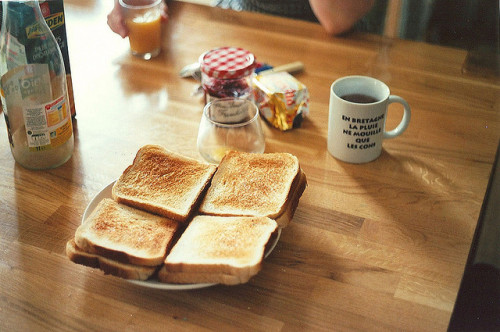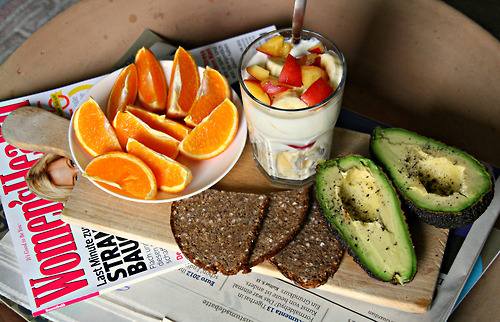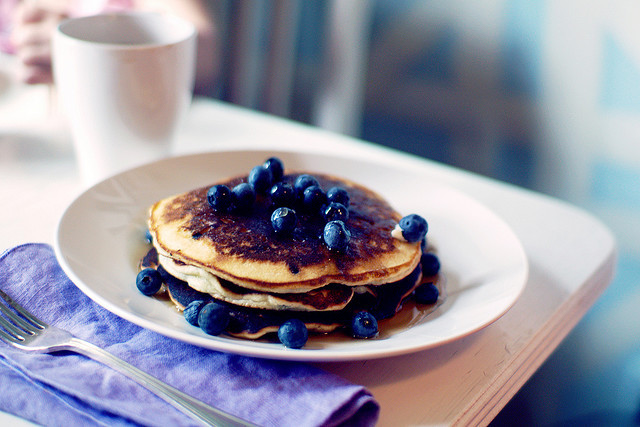Breaking the fast
As suggested by the name, by eating breakfast, we are in fact ‘breaking the fast’ as usually we haven’t eaten since previous dinner, some ten hours before. This helps to kick start the metabolism for the day. If we do not eat for long periods of time, our bodies have a tendency to store energy as fat for reserves rather than burning it. People who skip breakfast and do not eat until lunch time, which could be a good sixteen or more hours after their last meal, risk this fat storage as the body is not sure when it will next receive fuel.
Fuel for the day
Eating breakfast provides fuel for your body and gives you energy for the day. Without breakfast, or with an inadequate breakfast, such as a cup of coffee, you are likely to feel sluggish and lethargic before it’s even morning coffee break. By eating a healthy, nutritious breakfast, you are providing your body with important nutrients, as well as the energy it needs to perform at its best throughout the day. A high fibre and protein breakfast can keep you fuller for longer and prevent snacking throughout the day, thus reducing overall calories. Eating breakfast has also been shown to improve concentration, meaning you are likely to work more efficiently.
Avoid mid-morning binges
Those who do not eat breakfast are much more likely to turn to unhealthy, calorie laden foods later in the day. If you have skipped breakfast you are likely to be starving by mid morning, leading to snacking on whatever is available, not matter how unhealthy. This intense hunger and low blood sugar levels (See also Glycemic Index) can lead to cravings for sugar and fat laden foods, which offer very little nutritional benefit and a huge amount of calories.
Make Healthier choices
By eating a healthy breakfast paced with nutrients, you are setting yourself up for a good start to the day. When you begin the day on a healthy note, you are more likely to continue this way for the rest of the day. On the other hand, if you start the day with a donut and a coffee, it is easy to write the day off as an unhealthy one and make no effort to eat well for the rest of the day. (See also what are the healthiest foods to eat)
The best breakfasts for weight loss
High in fibre and protein, low in fat and sugar
An ideal breakfast to help you lose weight and keep it off should be high in fibre and protein, as this will keep you fuller for longer. It should also be low in sugar and fat. A high sugar breakfast is likely to give you a quick burst of energy, followed by a slump when the sugar levels drop leading to cravings for more sugary foods. The best breakfasts are also balanced, containing a combination of food groups for a wide range of vitamins or minerals. Try to avoid empty calorie choices that provide a lot of calories and very little nutritional benefit, such as donuts, pastries, high sugar cereals and high fat meats such as bacon. If possible include a high fibre complex carbohydrate source, a low fat protein source and a fruit or vegetable for well balanced meal every morning.
Portion size still matters
Portion sizes are also very important for weight loss. Even if you eat the healthiest breakfast, if you eat large portions, you will still gain weight. Read nutrition labels to get an idea of what is considered a serve size and how many calories in a serve. If necessary measure out a portion the first time, so you know exactly how big it is. Base you breakfast calories on about a quarter of your daily energy requirements for weight loss, around 250 to 300 calories, depending on your weight, height, physical activity levels and sex.
Coffee and juice in moderation
Aside from food intake, it is also important to remember that drinks also contribute a large amount of calories, and are often overlooked by people trying to lose weight. Juices, whilst providing a lot of vitamins, are high in calories and should be limited or replaced with a piece of fresh fruit, which provides much more fibre and less calories than juiced versions (See also healthy weight loss drinks). Alternatively opt for vegetable juices as these contain less calories. Always choose low fat dairy to minimize fat and calorie content, and remember that many commercial coffees are very high in calories and fat, due to their large size and sweet additions such as syrups. (See also Does coffee help you lose weight?) Smoothies can also be misleading, with commercial versions containing huge amounts of calories from added sugars, syrups and sometimes no actual fruit. It is best to make your own smoothie at home to be completely sure of the content.
Healthy breakfast ideas for weight loss
- Oatmeal made with fat free milk and topped with banana or other fruits
- High fibre (about 3-4g per serve), low sugar and fat cereal with fat free natural yogurt, fat free milk and a piece of fruit.
- Healthy breakfast sandwich made with two slices of whole grain bread, 2 slices of lean bacon or turkey bacon, tomato, lettuce and a spread of low fat mayo.
- Two egg omelettes with mushrooms, capsicums and herbs, served with a slice of wholegrain toast.
- Whole grain toast with peanut butter and a piece of fruit.
- Low fat smoothie with fat free milk, fresh or frozen fruit and no fat yogurt. Add a tablespoon of muesli for added fibre.
- Poached eggs with spinach and whole grain toast.
- Low or no fat yogurt topped with fresh fruit salad and a sprinkle of natural muesli.

What to avoid
- Pastries, donuts and cakes. These are high in fat and sugar and provide very little nutritional benefit.
- Bagels. Unfortunately these are the calorie equivalent of five or six slices of bread.
- Fry- ups. High fat meat such as bacon and sausages, combined with high fat cooking methods does not make for a healthy choice.
- High sugar cereals and toasted muesli. These contain a lot of calories and in the case of the muesli, a large amount of fat. Choose natural muesli as a better alternative.
- Breakfast bars, muesli bars and pop tarts. These are all high in sugar and generally provide very little fibre or protein.
Source
References used in this article




No comments:
Post a Comment